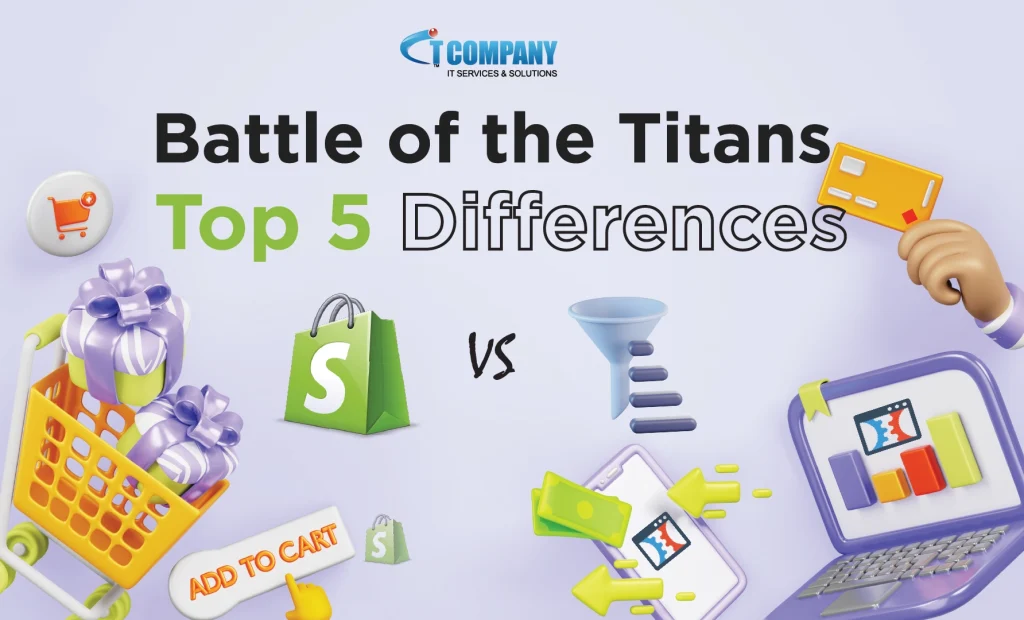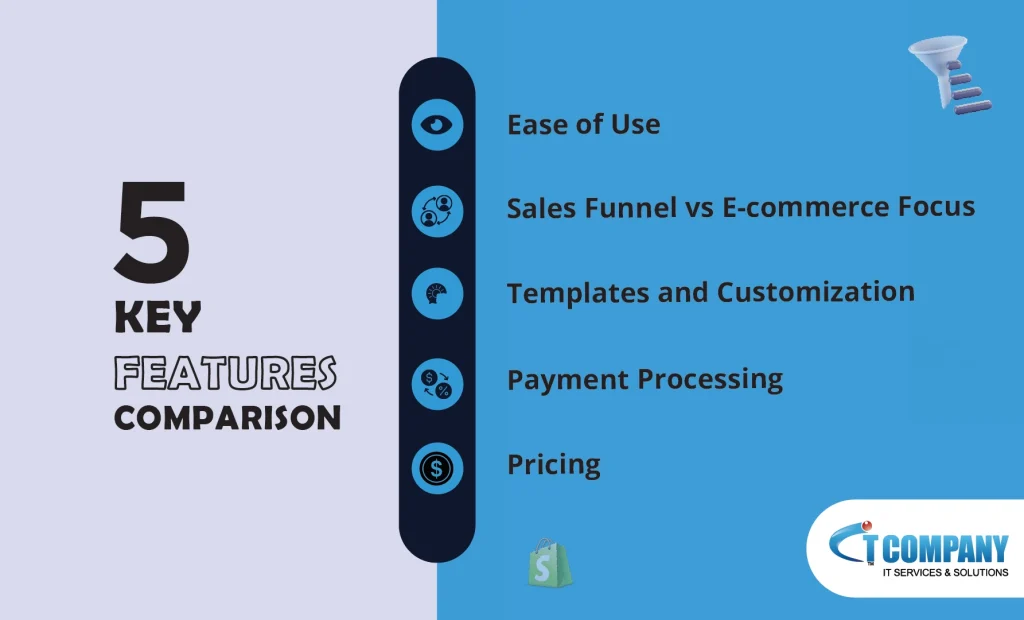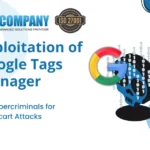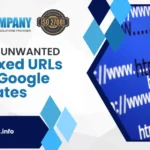
Table of Contents
ToggleIntroduction
In the rapidly evolving landscape of digital marketing and e-commerce, two platforms have emerged as leaders in their respective domains—ClickFunnels and Shopify. Each offers a unique set of features and benefits that cater to the needs of digital marketers and e-commerce entrepreneurs. But which one is right for you? This comparison will dissect both platforms, helping you make an informed decision.
Overview of ClickFunnels and Shopify
ClickFunnels
ClickFunnels is primarily designed for creating high-converting sales funnels. It allows users to build marketing funnels that guide potential customers through a series of steps—from landing page design to checkout. It’s best suited for marketers focused on lead generation and sales.
Shopify
Shopify, on the other hand, is a comprehensive e-commerce platform that enables businesses to set up and manage their online stores. With a robust set of tools for product management, payment processing, and inventory tracking, Shopify is ideal for entrepreneurs looking to sell products online.
Key Features Comparison

1. Ease of Use
- ClickFunnels: Offers a user-friendly interface with drag-and-drop functionality, making it easy to design funnels even without coding knowledge.
- Shopify: While also user-friendly, it may have a steeper learning curve due to its extensive features tailored for e-commerce.
Features and Capabilities of Shopify
| Feature/Capability | Description |
| Storefront Customization | Easily customize website themes and layouts without needing extensive coding knowledge. |
| Product Management | Manage inventory, product variants, and collections efficiently. |
| Payment Gateways | Support for multiple payment gateways including Shopify Payments, PayPal, Stripe, and more. |
| Sales Channels | Sell across multiple channels like Facebook, Instagram, Amazon, and eBay from within Shopify. |
| Marketing and SEO Tools | Built-in tools for SEO optimization, social media integration, and email marketing campaigns. |
| Analytics and Reporting | Track sales trends, visitor behavior, and other key metrics with built-in analytics tools. |
| App Store Integration | Extensive library of apps and integrations to extend functionality based on business needs. |
| Mobile Optimized | Mobile-responsive design ensures a seamless shopping experience on smartphones and tablets. |
| Customer Support | 24/7 support via phone, email, and live chat, along with community forums and extensive documentation. |
Features and Capabilities of ClickFunnels
| Feature/Capability | Description |
| Funnel Building | Easily create sales funnels and marketing funnels with a simple drag-and-drop editor, no coding required. |
| Landing Page Customization | Customize landing pages and funnel steps to match branding and marketing needs. |
| Payment Gateways | Integration with major payment gateways like Stripe and PayPal for seamless transaction processing. |
| Membership Sites | Create membership sites and manage content access for subscribers. |
| Email Integration | Built-in email marketing automation and integration with popular email service providers like Mailchimp and AWeber. |
| A/B Testing | Test different funnel variations to optimize conversion rates and performance. |
| Analytics and Reporting | Track performance metrics such as conversion rates, revenue per visitor, and more with detailed analytics tools. |
| CRM Integration | Integration with CRM platforms like Salesforce to manage customer relationships effectively. |
| Affiliate Management | Manage affiliate programs and track affiliate performance within ClickFunnels. |
| Automation | Set up automated workflows and sequences to nurture leads and drive sales. |
| Webinar Funnels | Create webinar funnels to host live or automated webinars and engage with prospects. |
| Upsell and Downsell Funnels | Increase average order value by offering upsells and downsells within your funnels. |
| Mobile Optimized | Ensure a seamless user experience on mobile devices with responsive funnel designs. |
| Customer Support | Access to customer support via email and extensive online resources including tutorials and community forums. |
2. Sales Funnel vs E-commerce Focus
- ClickFunnels: Specializes in sales funnels, lead generation, and upselling strategies. It’s particularly effective for marketers who rely on funnel marketing techniques.
- Shopify: Focused on full-fledged e-commerce capabilities, including product listings, shopping cart functions, and customer account management.
3. Payment Processing
- ClickFunnels: Integrates with several payment gateways but may charge extra for certain features like recurring billing.
- Shopify: Comes with built-in payment processing options and offers Shopify Payments, eliminating transaction fees for users.
4. Templates and Customization
- ClickFunnels: Provides a variety of pre-designed funnel templates that can be customized to fit your brand’s identity.
- Shopify: Offers many responsive themes that can be tailored, but customization may require some technical skills or coding knowledge.
5. Pricing
- ClickFunnels:
- Basic plan starts at $147/month.
- Advanced plan available for $297/month.
- Shopify:
- Basic plan starts at $39/month.
- Higher tiers available with additional features.
Strengths and Weaknesses
ClickFunnels Strengths
- Highly effective for generating leads and driving sales through funnels.
- Easy to set up and intuitive interface.
- Powerful upsell and downsell features to maximize revenue.
ClickFunnels Weaknesses
- Better suited for marketers than traditional e-commerce.
- Higher pricing may deter small businesses.
Shopify Strengths
- Comprehensive e-commerce solution with extensive features.
- Supports physical and digital product sales.
- Large app marketplace for additional functionalities.
Shopify Weaknesses
- Can become expensive as you scale with add-ons and transaction fees.
- Slightly less intuitive for users focused solely on marketing funnels.
Strengths
Shopify excels in user-friendliness, making it accessible for entrepreneurs and businesses to set up and manage online stores quickly. Its robust ecosystem of mobile apps and API integrations allows customization and scalability as businesses grow. The platform’s strong focus on e-commerce functionality, combined with its reliable hosting and security features, ensures a stable and secure shopping experience for customers.
Weaknesses
While Shopify offers extensive customization options, deep customization may require knowledge of Liquid (Shopify’s templating language). Additionally, transaction fees apply unless using Shopify Payments, which could impact profit margins for smaller businesses.
Conclusion
Both ClickFunnels and Shopify are powerful platforms tailored for different audiences. If you’re a digital marketer focused on building sales funnels and generating leads, ClickFunnels may be your best bet. Conversely, if you’re an entrepreneur looking to establish a full online store with comprehensive e-commerce features, Shopify is the optimal choice.
Ultimately, the right platform for you will depend on your specific business goals and needs. Consider what you want to achieve and choose the platform that aligns best with your strategy. Happy selling!




